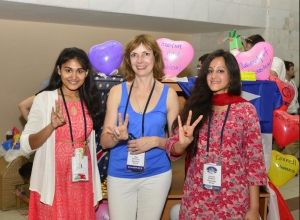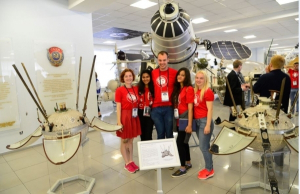Most of us are quite comfortable to report that over summer vacation we participated in the typical leisure activities that recharge our scholastic batteries. Maybe we hung out at the beach, hung ten on a surfboard or hung ten knuckles over the controller of an Xbox. But two UH Cullen College of Engineering students stepped it up a notch, hanging out in Moscow’s Red Square courtesy of the Baker Institute Space Policy Summer Intern Program. What makes their summer journey truly special is that they were two of only ten students selected from the United States and 150 from around the world.
Anchal Bhaskar, who is working on her master’s degree in space architecture, and Jincy Philip, studying for her bachelor’s in mechanical engineering, flew to Russia with students from Rice University, Texas A&M University, Brown University, Cornell University and the University of Southern California.
Once there, Bhaskar and Philip met and worked with their global counterparts – which, according to the Baker Institute, is the point of the program: to foster collaborations with engineering and science students from all corners of the world to design projects for space. As NASA proudly points out, the International Space Station (ISS) is equal parts international cooperation and technological achievement. The Baker Institute’s idea is to emulate that success on a collegiate level.
“It was a wonderful experience to see how we will work together in the space industry in the future to make a collaboration where there will be people from different countries working together,” said Bhaskar.
“From the very beginning, students in the program tell us how amazing it would have been if we had all cooperated together in the beginning of the space era. Think of how much we could have achieved together,” said Olga Bannova, director of the UH Sasakawa International Center for Space Architecture (SICSA), offering the world’s only master’s degree in space architecture. “We would already be on Mars.” Bannova accompanies the students to Russia.
Their galactic challenge
The program is hosted by the Youth Space Center of Bauman Moscow State Technical University, which conducts an annual international workshop on space development theory and practice. During the two-week workshop, the students had to propose a schematic design for creating a one-kilometer diameter space telescope using asteroid materials.
“We were doing all the design work, defining the density, mass and weight, and we got to know some cool software programs that other people were using in other countries,” said Philip.
Though a space telescope is a necessity (just look to – or through – the Hubble) a one-kilometer mirror made of asteroid materials is probably not essential, but the task stimulates innovative ideas.
“We can do such challenges at the student level so that we can learn more and face more challenges, because at the practical level, when we are working we won’t be given such innovative projects,” said Bhaskar.
They also got to go to the Roscosmos Mission Control Center to speak live and ask questions of cosmonauts on the ISS, a thrill the pair is still over the moon about.
Last year Chris Gay, an electrical engineering student at the Cullen College, won the opportunity, along with three other UH Cullen College students, to go to Russia with the Baker group. He learned many lessons, he said, about his “awesome” experience, but what stands out strongest to him is a lesson of international hospitality.
“The highlight to me was the first night in Russia. It was the Fourth of July and we had a group from Switzerland, Russia and the U.S. We were all getting to know each other and someone had the idea to go to a local pub,” said Gay. “So we spent the Fourth of July in an Irish pub in Russia and it was the most American Fourth of July that I have ever experienced!”
It’s a great launching pad
Bannova says the summer program, which she helped bring to the United States in 2011 along with the Baker Institute and former NASA Johnson Space Center director George Abbey, senior fellow in space policy at Baker Institute for Public Policy, is a great way to begin a career in the space industry.
“Quite a few of our program’s graduates already work in the space industry at the European Space Agency (ESA), Roscosmos and NASA,” said Bannova. “Our hope is one day they will be working together at an international level.”
And why not? According to Bannova the sky is not the limit for these talented minds.

